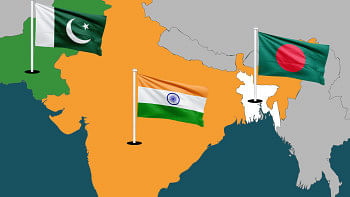The ‘woman question’ and the legacy of colonial patriarchy

Following July-August last year, the "woman question" was almost about to slip through the cracks and lose to other issues prioritised by those who dominate the logics of politics. Better late than never though, a commission was formed, which has now come up with comprehensive reform proposals. Many of these proposals would require separate analysis. Here, I limit myself to the proposed uniform family code governing family affairs. I will not discuss the pros of having such a code for women and men as such, but will venture into a hitherto uncharted area within the public discourse. I will try to trace the roots of the backlash that this proposal is currently facing.
The proposal for an explicitly "optional" uniform family code is being perceived as a "threat" by the religious elites as interference with religion and with the "home." The roots of this perception certainly lie in patriarchal dominance. But as we dig more carefully, the roots will lead us to hegemonic colonial masculinity as well.
One of the inventions of alien rule in the Indian subcontinent was the murky and false public-private dichotomy. Such a dichotomy, as part of the administrative schema of divide and rule, was politically expedient for the alien rulers. For instance, in Mughal Bengal, in general, Muslims as well as Hindus were governed by Muslim law in both civil and criminal matters. However, in cases such as inheritance and marriage, Hindus were governed by their own Shastric Hindu law.
This was no different for the British rulers. With the rise of the East India Company in Bengal, the Mughals' diwani and treasury departments were transferred to it. Several years of chaos, anarchy, and misgovernance by the company then followed. Finally, Warren Hastings was sent to reform Bengal's revenue and judicial systems. In his proposed reform regulations, there was a clause stipulating that the "Muslim and Hindu inhabitants shall be subject only to their own laws." Thus, the British showed commitment towards personal law systems and, in turn, towards "protecting" the private spheres.
Some say the British were not "audacious enough" to interfere with the "home" (i.e. they were fearful of hurting the natives' sentiments). Notably however, the native nationalist sentiments were rather dormant, if not non-existent, when the British made it a policy to leave aspects of the "home" untouched. It was therefore more about being pragmatic as a colonial administrator and less about being fearful of the natives' sentiments. Also, they did selectively interfere with certain aspects of the "private" (e.g. child marriage, practice of sati). Such interference augmented their savage-victim-saviour narrative (i.e. White men saving Brown women from Brown men, as Gayatri Spivak would say) and helped produce consent in favour of colonising an "uncivilised breed."
But how exactly did the general non-interference policy help the British? Indeed, by doing so, the British could appropriate the colonised people's "faith" and "religion" and thereby grant the native males (both Muslim and Hindu) a sense of "pseudo-autonomy" within the so-called "private spheres." This pseudo-autonomy implied that the "home" is "governed" by religion (or how the native men wanted to interpret it), and not by the British. However, while the native men were content with the "home" being imagined as an autonomous institution, free from the excesses of alien governance and interference, British rule pervaded the entire public spheres.
Furthermore, the British did not stop at ideating the scheme of public-private dichotomy; rather, they solidified it through laws. Scholars explain how a positivist edifice of personal laws was created by the British. In an arbitrary manner, the British categorised the pre-colonial customs and laws governing personal affairs (such as marriage, inheritance, and maintenance) as "religious" and all other aspects as "secular" and hence capable of being legislated on (i.e. interfered with). This categorisation was not rigid but flexible, as per administrative needs and requirements. In the beginning, laws of contract were listed as religious or personal law issues. However, as Flavia Agnes shows, since contractual relationships were key to a capitalist colonial economy, they were weeded out of the domain of "religion" and transformed into territorial laws, applicable uniformly to all British subjects regardless of faith. Similarly, Islamic criminal laws were disentangled from the so-called "religion" by the colonial lawmakers at their whims and convenience. Likewise, all aspects of Hindu life fashioned as civil and criminal matters that could find their origin in "Manu's classification of eighteen heads of law" were interfered with.
Thus, the rules of personal laws based upon centuries-old interpretations (and mis- or convenient interpretations) became the rigid letters of law, and over time, turned into almost an unchangeable monolithic entity. The natives sought comfort in their so-called autonomy and self-governance within the "home"—unknowingly, under the authority of laws written by the British. I think the alien rulers, and especially the British, should be hailed for how their colonial logics made their way into the cognitive framing of the natives across generations and ended up forging a strong alliance with the crude logics of patriarchy.
Notably, the commission has proposed for an "optional" code (i.e. as a short-term policy-legal goal) where a propositus will have the option to subscribe to either the uniform family laws or the religious laws. There may certainly be legitimate concerns regarding how such an option will work in practice. There may also be concerns regarding its fragility as a reform, always susceptible to backlash and prone to backsliding. However, what we hear as "opposing views" do not touch on any nuances; they are rather blunt, openly promoting inequality and perpetual subordination of women. It is crucial that we pay heed to the radical dissents couched in the language of religious freedom, values, and sentiments, and to how the state reacts to the same. Because all of these will reveal to us the positionality of the "woman question" both within our agenda of songskar and of a boishomyobihin society.
Equal marriage, inheritance, and maintenance laws (be it through incremental reforms within the personals laws or through an optional uniform code) can certainly translate into substantive equality for women and men. Such laws will not go alone, of course, as we will need adequate tools to secure financial independence for women and their safety from harassment and violence in both private and public life. We also require reasonable accommodations in the labour market and within built infrastructures so that women can exercise their rights and contribute to the economy.
With secure variables, equal marriage and family laws can eventually lead to healthy shouldering of financial responsibilities, too, as the brunt of otherwise is often disproportionately borne by men. Notably, reforms in Muslim personal laws have been brought in Tunisia, Turkey, and Egypt, among others (reforms to Hindu personal laws have been brought in India and Nepal too). These comparative experiences do not garner much support from our kins. They perhaps do not realise it, but when factions of our religious elites perceive crucial reform proposals in favour of gender-based equality as a threat, they in fact reproduce and perpetuate the colonial logics and end up ruling their and others' homes as proxy colonial masters.
Psymhe Wadud teaches law at the University of Dhaka and is in charge of Law & Our Rights at The Daily Star.
Views expressed in this article are the author's own.
Follow The Daily Star Opinion on Facebook for the latest opinions, commentaries, and analyses by experts and professionals. To contribute your article or letter to The Daily Star Opinion, see our submission guidelines.


 For all latest news, follow The Daily Star's Google News channel.
For all latest news, follow The Daily Star's Google News channel. 








Comments